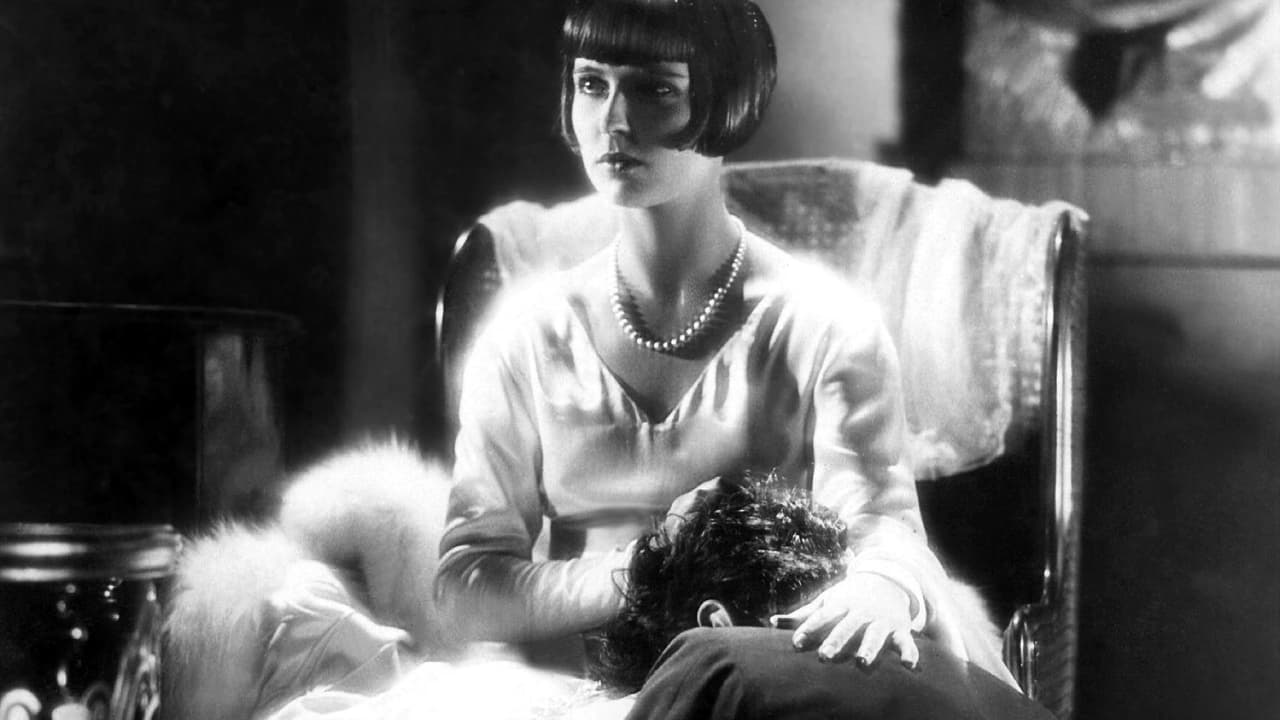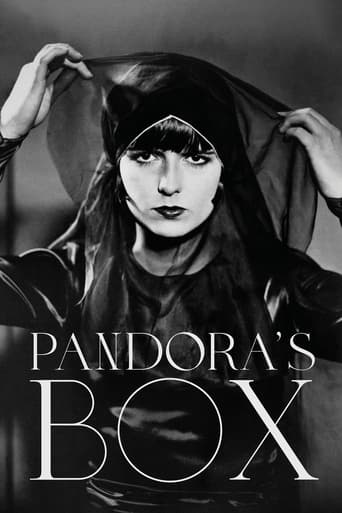Flyerplesys
Perfectly adorable
Softwing
Most undeservingly overhyped movie of all time??
ReaderKenka
Let's be realistic.
Payno
I think this is a new genre that they're all sort of working their way through it and haven't got all the kinks worked out yet but it's a genre that works for me.
Horst in Translation (filmreviews@web.de)
"Die Büchse der Pandora" or "Pandora's Box" is a 1929 black-and-white silent movie, so this one is already over 85 years old. It stars Louise Brooks, a dark-haired actress, who is probably more known today than she was back then. Despite being American-born she starred several times in the films of Georg Wilhelm Pabst, one of Germany's top silent film directors. Unfortunately, I cannot appreciate this film here as much as most others do judging from the movie's IMDb rating. It has an interesting premise, especially taking into account when it was made, but that's also it pretty much. There are a couple fine scenes in here, but it's not even close to being enough for a film that runs considerable over 2 hours. I was pretty much bored by it I have to say and it also did not help that I found the main character very uninteresting despite how hard they tried to make her as interesting and controversial as possible. Then again, I am not the greatest silent film fan out there, so I may be a bit biased, but nonetheless there are a handful of films from the silent era that I managed to appreciate a lot more than this one. Then again, there's also some that I liked even less, such as the Mabuse film for example. As a whole, this may have been a much better watch at 80 minutes perhaps, but for this massive duration the material simply wasn't enough. An epitome of how quality does not match quantity. Not recommended.
thinbeach
'Pandora's Box' is what 'It' might have looked had it been written by Erich von Stroheim and directed by FW Murnau. Instead of a romantic comedy, we get a softly lit noir where the sexy flirtatious girl is caught up in a web of crime and devious desires. The Greek myth of Pandora claims her to be a beautiful charming girl who brings evil to all around her, and with Lulu representing Pandora, the film doesn't deviate from this script, although as one misadventure brings about another, we see her get a weighty dose of Karma, and become quite a memorable anti-hero. Just as Lulu's flaws are laid bare however, so are those of the male characters, who one after the other fall for her, and bring their own wickedness to the frame.Not being familiar with the story before watching, and not quite understanding the censorship in place in 1929, I wasn't sure if she was a prostitute or not (it is heavily hinted at, rather than shown explicitly). It made sense in the number of men she lead on, but not in the way they appeared to desire her love and marriage, while another who claimed to be her father acted more like a wannabe over. Even the newly married husband thought he was not father but lover, and wanted to kill because of it. Surely the groom wouldn't make that mistake! The uncertainty made the plot hard to swallow at times, and enticingly mysterious at others, so it was a double edged sword, but either way neither she nor any of the characters are particularly likable. At over two hours the film drags a bit, too much I think for anyone previously unfamiliar with silents, and with Lulu's unlikely escapes from the law, you need to take a few small leaps with the script. To the stories credit however, it is always told through action and dialogue, which is a great improvement on the many title-card reliant silents of the time.Aside from the strong cast performances, the most winning feature is the mood and atmosphere created by GW Pabst and co. The cinematography, particularly in the back half of the film, is stunning, and the shadowy darkness captures the evil lurking beneath, while the softness gives it all a kind of depressing romantic charm, as if to say, even in this sad place, there is beauty. The misty scenes at the end bring to mind Von Sternberg's compellingly shot unromantic romance 'Docks of New York'. The old saying is that you can't polish a turd - ie. you can't make a good film from a poor story- but these types of films provide a case that with strong photography, you can certainly make improvements.
LeonLouisRicci
One of the last great silent films this is a German movie that is surprisingly short on cinematic expressionism and long on the glamorous, sultry, hypnotic beauty of Louise Brooks. It is her dynamic performance and fallen Goddess looks that makes her, and by attachment Pandora's Box, a wonder to behold.The thematic sexual content is handled with reverence rather than raunchiness and it is her glorious, giddy, and sincere playful naive nature that is compelling. She not only, just by proximity, seduces any man in close contact, as well as the audience with a childish charm of calming cuteness but unleashes primal desire as well as a protective desire manifested by her magnetism.The film is long and deeply depressing but it carries us through to her inevitable descent and destruction with so much pathos that it is hard to detach oneself from her destiny and want this obviously playful, not prey-full, soul to live happily ever after. But this is not a fairy-tale and she is not Snow White. This is Greek tragedy.
chaos-rampant
Lulu is a social butterfly out for a good time, a femme who is fatale but only because the men lust after her so fiercely.Normally in film noir the femme fatale appears to us not so much a human being but an agent, a catalyst of some dangerous illusion. She is the wet dream from the private dick's perspective, desire personified. Hollywood probably took this up from Dietrich's persona in another German film, Blue Angel from the following year, the heartless diva who presents herself in a way that will satisfy her capricious whims.This is different though, and it is more stunning for this, the trick being that we see the world from the eyes of an innocent woman as she becomes shaped into a femme fatale. She is forced into the role and eventually plays it to perfection. The very fact that she is beautiful and sexy turns her into that prize that men would do anything to have. Film noir as we came to know it was about all these desperate efforts.It is still however film noir in the most incisive, essential way. Dual worlds linked by the turning of karmic wheels; from inside a cheerful, innocent woman who we know to be basically good and trying to live life, but who at the same time appears provocative, alluring, exuding sex, and therefore by her very nature, by the fact that she is the person she was born to be, seems to lull men into the kind of stupor where they can dream only her, a dream so intoxicating that in turn traps her in her image. The result is that she inhabits a different world than she weaves around her and, almost without exception, it's the jerk from one world to the other that yields the anxieties - from the private to the public, where a person is no longer himself but only the sum total of other peoples' views, and so an object of collective scrutiny or, as in our case, sexual paroxysm.So from her end life as a series of spontaneous, often inexplicable 'nows' but which we understand to be structured around her and unwittingly powered by herself. But from the other end life organized, and from their own ends again seemingly spontaneous, with the sole intent of having her. Men suddenly crave her - they don't know why, she doesn't - and will do anything, but who she also provokes without realizing, by simply being herself.This dual perspective that reverberates across the film, as much about the woman herself as both temptress and angelic swan, she can fit in both these roles as well as she actively pursues them, as about the swarm of men who surround her, at first pretending moral uprightness but finally more or less powerless before her charms, is ingeniously rendered in two scenes in particular.The first is set at the courthouse where she's at trial for murder; upon being pronounced guilty, her admirers quickly stage a commotion by setting off a fire alarm that allows them to extricate her. From the outside a chance emergency, the crowd dashing, clamoring, pushing for the exit, and from her end as well, unwitting, dumbfounded, in the middle of all this crowd being carried outside, but which we know was all orchestrated by the men who'd like to have her. Of course the fire alarm is about the fires of desire.The other is at a bar or gambling house where she has fled and is hiding for safety. A reward out on her name, various parties conspire to exploit the situation for a quick dime. Here, it is she who is spinning the most dazzling web of deceit - now improvising the role of the femme fatale on the spot, but out of pressing need. The most revealing game concocted by her: she petitions a man to gamble for her fortunes on a card table. He is winning, but of course is revealed that he was cheating all along.It ends with all these lives finally released from the grip of the karmic energies that have clasped them so tightly, the self- instructed destinies, each according to his own decree. The man who wishes he could eat Christmas pudding one more time gets to.Pabst orchestrates the finale as a dance of symbolic gestures; the most symbolic perhaps being that the woman had a heart of gold all along. We may had our doubts because she mingled with money, but now we know. The man doesn't to the end, this is the saddest destiny here. Of course at the cost of ever having her.

